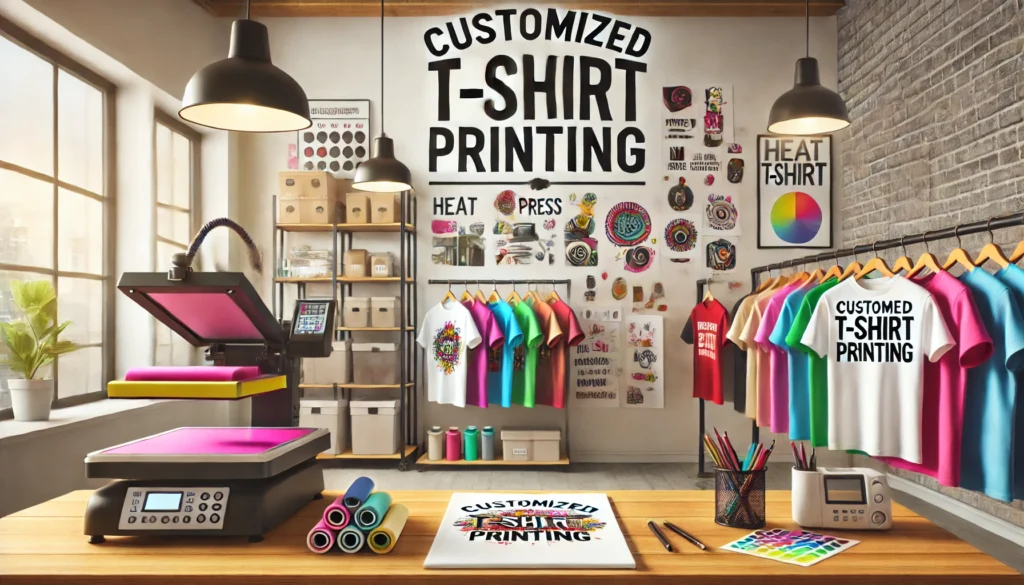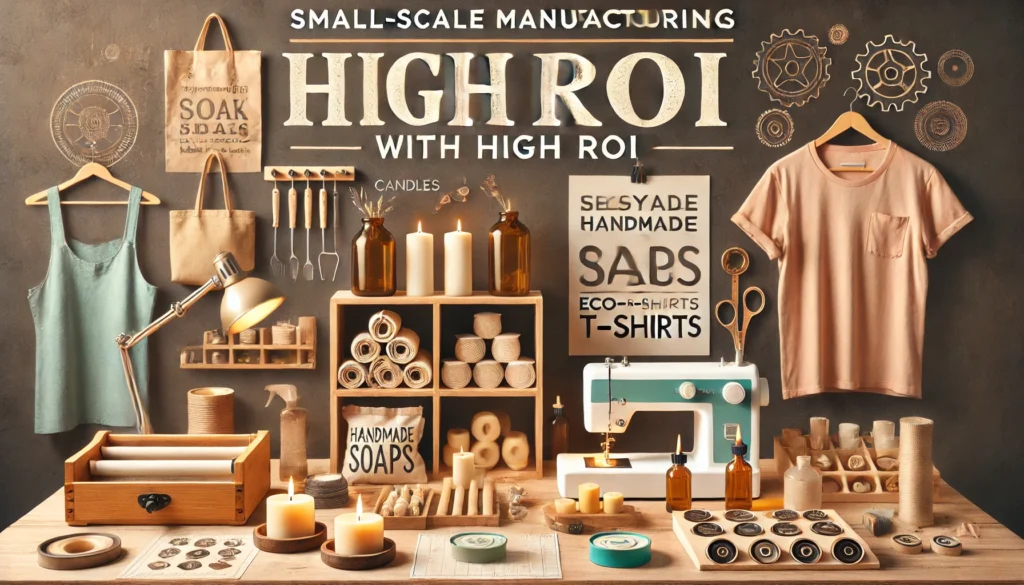Small-Scale Manufacturing Ideas with High ROI
Introduction
In today’s evolving business landscape, small-scale manufacturing has emerged as a profitable, accessible, and flexible option for entrepreneurs seeking to build a high-ROI venture. Unlike traditional large-scale industries, which demand extensive capital and infrastructure, small-scale setups are attainable and provide adaptability in product offerings. These businesses can also pivot quickly, tapping into market trends with minimal risk.
This comprehensive guide explores several lucrative small-scale manufacturing ideas with high ROI, each with market insights, practical startup steps, profitability strategies, and marketing advice. Whether you are considering entering a niche market or producing high-demand goods, this article will equip you with the knowledge to make an informed decision and start building your path to profit.

Benefits of Small-Scale Manufacturing
Understanding the unique advantages of small-scale manufacturing can help you leverage these benefits to maximize returns and sustain long-term growth:
Cost Efficiency: Smaller-scale operations require fewer resources, lower investment, and manageable operational costs, making them a good starting point for new entrepreneurs.
Adaptability and Flexibility: Small manufacturers can quickly adjust their offerings to match changing market trends, such as seasonal products or limited-edition items.
Targeted Niche Focus: Small-scale businesses thrive by catering to niche audiences, such as eco-conscious or health-focused consumers, allowing for premium pricing and strong customer loyalty.
Efficient Cash Flow: High turnover products (such as personal care items or customized apparel) enable small manufacturers to reinvest profits into growth without relying on external financing.
Scalability: Start small, grow as demand increases—small-scale manufacturing businesses offer entrepreneurs the chance to expand gradually and diversify offerings as they scale.
Top Small-Scale Manufacturing Ideas with High ROI
Candle Manufacturing
Why Candle Manufacturing?
Candle manufacturing is a lucrative small-scale business due to the diverse market demand. Candles are popular in home decor, aromatherapy, and gift markets, and they’re perfect for seasonal promotions. Additionally, manufacturing candles allows for endless customization options, making it ideal for reaching niche audiences like eco-conscious consumers (with soy or beeswax candles) or those seeking luxurious home scents.
Real-World Example
Brands like Homesick Candles and Diptyque have tapped into niche markets by creating themed candles that evoke specific emotions or memories. Homesick, for example, makes candles inspired by different locations, giving customers a nostalgic connection.
Startup Requirements
Materials Needed: Wax (soy, beeswax, or paraffin), wicks, essential oils for fragrance, molds, and decorative jars or packaging.
Initial Investment: $500-$1,500 for equipment like wax melters, molds, and raw materials.
Production Tips: Experiment with fragrance combinations and color variations to create unique products that stand out in the market.
Marketing Tips
Leverage Social Media Platforms: Use Instagram and Pinterest to create visually appealing content showcasing candle designs. Behind-the-scenes videos, like candle pouring or packaging, also resonate well with viewers.
Target Seasonal Events: Market themed candles around holidays or special events, such as Christmas, Halloween, or Valentine’s Day.
Influencer Collaborations: Partner with influencers to showcase your candles in home decor or wellness routines.
Profit Potential
Given the low material costs, candles can have a markup of 200%-300%, especially for luxury or handmade variants. Branded, premium candles can sell for $20-$50 per piece, allowing for a high-profit margin.
Handmade Soap and Personal Care Products

Why Organic Personal Care?
Natural and organic personal care products are increasingly popular as consumers seek out health-friendly alternatives free from chemicals and preservatives. Handmade soaps, lotions, and scrubs cater to this market and offer small-scale manufacturers the chance to create customized, high-margin products.
Startup Requirements
Materials Needed: Essential oils, organic oils like coconut or olive, natural colorants, soap bases, and molds.
Initial Investment: $300-$1,000 depending on scale and product range.
Production Tips: Offer a variety of scents and ingredient options, such as moisturizing bars, exfoliating soaps, and essential oil-based fragrances.
Marketing Tips
SEO and Blogging: Create a website and blog to target keywords like “natural soap,” “organic skincare,” and “handmade beauty products.” Provide informative content to drive traffic and build trust with potential customers.
Subscription Boxes: Partner with popular subscription boxes that focus on natural or handmade products to reach a broad audience.
Customer Education: Promote the health benefits of each ingredient and how they address skin concerns, from dry skin to acne.
Real-World Success Story
Lush Cosmetics began as a small-scale, handmade product business and is now a major global brand. Its success lies in its commitment to ethical sourcing, product transparency, and strong branding, which resonates with eco-conscious and health-focused consumers.
Profitability
Handmade soaps and skincare products are known for high markups (200%-500%). With effective branding, businesses can charge $5-$15 for a single soap bar, while more complex skincare items can command even higher prices.
Eco-Friendly Bag Manufacturing
The Demand for Sustainable Bags
The shift toward environmental sustainability has boosted demand for reusable and biodegradable bags. Small-scale manufacturers can tap into this market by creating customized, eco-friendly bags for businesses and consumers looking to reduce plastic use.
Startup Requirements
Materials Needed: Jute, cotton, hemp, or recycled fabrics, along with sewing equipment and printing supplies.
Initial Investment: $500-$2,000 depending on equipment and fabric quality.
Production Tips: Diversify offerings by creating tote bags, grocery bags, or backpacks and allowing custom logo options for corporate branding.
Marketing Tips
Highlight Eco-Benefits: Emphasize the environmental impact of using eco-friendly materials to attract eco-conscious consumers.
Corporate Collaborations: Partner with businesses looking for sustainable branding options, such as corporate gifts or branded reusable bags.
E-commerce Optimization: List your bags on platforms like Etsy and Amazon and optimize with keywords like “reusable bag,” “eco-friendly tote,” and “biodegradable bag.”
Case Study
Baggu, an eco-friendly bag company, started with simple, durable totes and expanded its line by tapping into sustainable fashion. Baggu’s focus on quality, functionality, and aesthetics has garnered a loyal following and enabled it to expand its product line to various styles and uses.
Profitability
Eco-friendly bags are inexpensive to produce and can be sold at a premium, particularly when marketed as sustainable and high-quality. Retail prices for durable bags range from $10 to $40, allowing for good profit margins.
4. Customized T-Shirt Printing

Why Custom Apparel?
Custom apparel is a high-demand market with potential for diverse customer segments, from corporate clients to sports teams and individual consumers. Custom t-shirts can be produced on demand, minimizing inventory costs and enabling manufacturers to adapt to current trends.
Startup Requirements
Equipment Needed: Heat press machine, printer for custom transfers, and blank t-shirts.
Initial Investment: $1,000-$3,000 for a basic setup.
Production Tips: Allow for personalized designs, including text and imagery, to appeal to a broader audience. Seasonal and limited-edition designs can also attract customers.
Marketing Tips
Niche Targeting: Target specific niches, like pet lovers or fitness enthusiasts, with themed designs and slogans.
Influencer Partnerships: Work with micro-influencers to showcase the versatility and personalization options of your t-shirts.
Social Media Ad Campaigns: Run Facebook and Instagram ads to attract customers, especially around peak times like holiday seasons or graduation.
Real-World Example
Printful is a print-on-demand company that allows small business owners to create custom apparel without holding inventory. Its success lies in catering to niche markets with print-on-demand services and leveraging e-commerce platforms to reach a global audience.
Profitability
Custom t-shirts can be produced for $5-$10 per unit and sold for $20-$35, making it a profitable business model with flexibility to adjust for various customer needs.
Handmade Jewelry Manufacturing
The Appeal of Custom Jewelry
Custom jewelry appeals to consumers who value personalized and unique accessories. From earrings and necklaces to bracelets, small-scale jewelry manufacturing allows for creative designs that cater to specific tastes and occasions.
Startup Requirements
Materials Needed: Metals, beads, semi-precious stones, and jewelry-making tools.
Initial Investment: $500-$1,500 depending on materials and scope.
Production Tips: Offer engraving options, customizations by birthstone or design, and limited-edition collections for special occasions.
Marketing Tips
Focus on Visual Platforms: Instagram and Pinterest are ideal for promoting handmade jewelry with high-quality photos and videos.
Emphasize Uniqueness: Highlight the one-of-a-kind nature of your jewelry pieces to attract customers looking for exclusive designs.
Local Partnerships: Partner with boutique stores or attend local craft fairs to introduce your jewelry to local markets.
Case Study
Mejuri, a Canadian jewelry brand, began with a direct-to-consumer model that focused on affordable, luxury pieces. Mejuri’s success has come from its emphasis on timeless designs, marketing via social media influencers, and selling through its e-commerce platform.
Profitability
Custom jewelry has high profit potential, especially for unique or seasonal designs. Markups for jewelry can range from 300% to 700%, particularly for pieces that use semi-precious stones or intricate designs.
Key Tips to Boost ROI in Small-Scale Manufacturing

Streamline Production for Efficiency
Minimize waste, optimize workspace layout, and standardize processes for quicker, smoother production. This reduces costs and enhances productivity, directly boosting profits.
Leverage E-commerce and SEO
Optimize product listings with keywords relevant to your niche to improve online visibility. Use content marketing (e.g., blogs, how-to guides) to drive traffic to your e-commerce site and establish brand credibility.
Engage Customers with a Loyalty Program
Create a loyalty program to encourage repeat purchases. Offer discounts, exclusive access to new releases, or referral rewards to build customer loyalty and increase lifetime value.
Embrace Sustainability to Attract Eco-Conscious Consumers
Consumers are increasingly attracted to sustainable practices, which can be a unique selling point for your brand. Use recyclable packaging, source responsibly, and promote your eco-friendly initiatives.
Track and Optimize Finances
Use accounting software to monitor expenses, revenue, and profits. Understanding your financial performance will allow you to make data-driven decisions and identify cost-saving opportunities.
Conclusion
Small-scale manufacturing provides an incredible opportunity for entrepreneurs to tap into high-demand markets with minimal initial investment. By selecting a viable niche, focusing on quality, and building a strategic marketing approach, you can create a profitable business that grows over time. Embrace the potential of small-scale manufacturing to start small, innovate, and develop a sustainable source of income.





